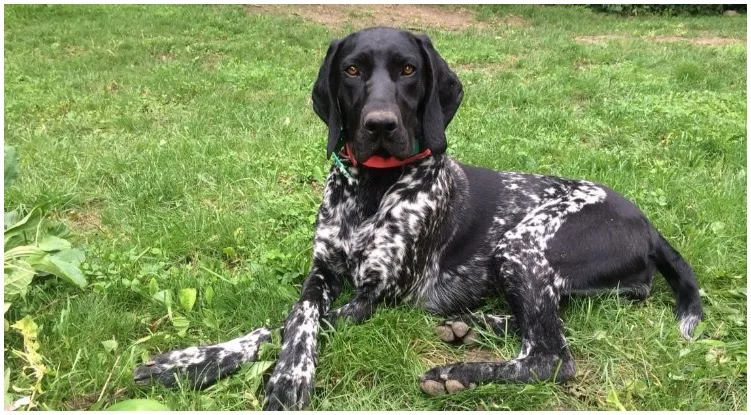The Black German Shorthaired Pointer is a superb hunting dog that also works amazing as an family dog or personal companion. They are amazing at hunting, however, if that’s not what you are about — don’t worry. They are just as good at curling up next to you on a sofa. But these dogs will also be happy to join you on hikes or jogging.
The Black German Shorthaired Pointer is a larger dog, with a muscular and elegant frame. They have dark, almond-shaped eyes. In addition to that, they also have an intelligent and well-behaved expression with a large, dark nose. Their ears are broad and dropped, laying flat against their head. Their coat is short, dense, sleek.
If we sparked up your interest about the Black German Shorthaired Pointer, keep on reading this article.
History
The GSP dates back to the 17th century where there were full on hunting dogs. The forerunner to the GSP, the German Pointer or German Bird Dog, was a product of crosses between Spanish Pointers and Bloodhounds. This was a big houndlike dog with a keen nose.
When it comes to the US, the first GSP was imported in 1925 by Dr. Charles Thornton of Montana. The was the first to start breeding these dogs. Only five years later, the breed was recognized by the American Kennel Club.
Size
When it comes to their size, GSP dogs are pretty large. Males usually get 23 to 25 inches tall and weigh 55 to 70 pounds. Females are 21 to 23 inches tall and weigh 45 to 60 pounds.
Personality
These dogs are smart, friendly and very willing to please you! These dogs are enthusiastic and love to be around you. That’s why they also don’t like to be left alone without you, so separation anxiety may be a huge issue. Even though they may seem tough, these pups are house dog, not a yard or kennel dog. They are highly trainable and you will have a great time with them as your companion.
Their temperament is affected by a number of factors, including heredity, training, and socialization. They are curious, playful and willing to approach people, even strangers. These sweet dogs therefore don’t make the best guard dogs.
But just like with any other dog, the Black German Shorthaired Pointer will need early socialization. Socialization helps ensure that your GSP puppy grows up to be a well-rounded dog. You can enroll them in a puppy kindergarten class and let professionals help you with it. That way your dog will be used to have other canines around even from an early age.
Health
The GSP is a generally healthy dog. However, just like with any other dog breed, they are still prone to certain health conditions. Not all dogs will get these diseases, however, it’s still important to be aware of them.
If you are currently looking for a puppy find a breeder who will show you health clearances for both your puppy’s parents. That will significantly lower the risk of your dog getting any of these diseases.
The most common health conditions that can affect German Shorthaired Pointers are:
- Hip Dysplasia
- Cancer
- Lymphedema
- Entropion
- Von Willebrand’s Disease
- Gastric dilatation-volvulus (GDV)
Care and Lifestyles
If you live in a smaller apartment or studio, the GSP most likely isn’t the dog for you. These canines need a lot of space, in addition to that, they also need a lot of exercise. So if you have a spacious house, and you love to be active — the Black German Shorthaired Pointer would be your perfect match. If they don’t get enough exercise, chances are that the GSP will become nervous and destructive. They enjoy hikes, longer walks, or a good game of fetch. If they do get enough exercise, they will stay calm and make amazing house dogs. They are curious and intelligent, and aren’t too prone to mischievous behaviors when you aren’t around.
Coat Color And Grooming
The coat of the Black German Shorthaired Pointer is, duh — black! However, the coat also has beautiful white spots, most commonly around their legs.
Their coat is short, thick and water-repellent. coat that’s slightly longer on the underside of the tail and the back edges of the rear end, known as the haunches. Their hair is softer, thinner and shorter around their head.
In addition to that, it’s also pretty easy to groom and they also don’t shed too much. However, you still need to brush them at least once a week and also bathe them when needed. In addition to that, examine their ears and clean them when needed. Don’t forget to clean their teeth and clip their nails as well.

